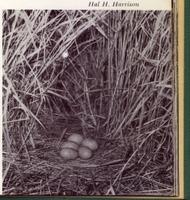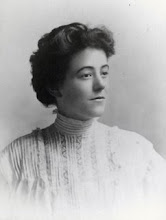American Bittern
John James Audubon

It's a rare thing to see an American bittern except in paintings. Like many marsh inhabitants, it hides in the reeds, and its coloration blends perfectly with the landscape. Only the most intrepid, patient, careful birder ever gets a glimpse.

The nest photograph is from a book entitled appropriately enough, Birds' Nests by Richard Headstrom, published in 1949 by Ives Washburn, Inc. The photographer was taken by Hal H. Harrison. The text accompanying the photograph reads: "The American Bittern inhabits almost impenitrable swampy places where it builds a practically flat platform of dead flags."
Further description from the book: III. Marshes A. Open Nest 5. In dense cattail marshes; partially concealed by new flags growing among tall dead flags of previous season's growth. A practically flat platform of dead flags, a foot or more in diameter, raised above water or mud only a few inches. Occasionally flags are arched over nest. Nests also found in meadows over almost dry ground. Gulf of Mexico north through eastern and central United States.

When I was about nine years old we heard an American bittern in one of my mother's favorite bird haunts, which at the time was facing development - that is, death - at the hands of a cement company. They wanted to mine the nearby dunes for sand, and it would have destroyed the surrounding area as well. Once you've heard the American bittern, you won't soon forget it. Its nickname is "thunder pumper", so called for a speech that sounds like an old fashioned well pump - priming the pump, as the saying goes.
John James Audubon

It's a rare thing to see an American bittern except in paintings. Like many marsh inhabitants, it hides in the reeds, and its coloration blends perfectly with the landscape. Only the most intrepid, patient, careful birder ever gets a glimpse.

The nest photograph is from a book entitled appropriately enough, Birds' Nests by Richard Headstrom, published in 1949 by Ives Washburn, Inc. The photographer was taken by Hal H. Harrison. The text accompanying the photograph reads: "The American Bittern inhabits almost impenitrable swampy places where it builds a practically flat platform of dead flags."
Further description from the book: III. Marshes A. Open Nest 5. In dense cattail marshes; partially concealed by new flags growing among tall dead flags of previous season's growth. A practically flat platform of dead flags, a foot or more in diameter, raised above water or mud only a few inches. Occasionally flags are arched over nest. Nests also found in meadows over almost dry ground. Gulf of Mexico north through eastern and central United States.

When I was about nine years old we heard an American bittern in one of my mother's favorite bird haunts, which at the time was facing development - that is, death - at the hands of a cement company. They wanted to mine the nearby dunes for sand, and it would have destroyed the surrounding area as well. Once you've heard the American bittern, you won't soon forget it. Its nickname is "thunder pumper", so called for a speech that sounds like an old fashioned well pump - priming the pump, as the saying goes.
It seems that many of the places we used to go "birding" had well pumps, the state nature stations and preserves particularly. When we heard the bittern, the sound of the pump was recognizable straight away. That was the only time in my life I ever heard it, until this summer. Walking along a populated stretch of road at twilight my ears picked up the unmistakable sound. The residents in the locale have maintained the environment as much as possible, so the bittern, formerly reclusive, apparently has moved a little closer to town. I almost went back with a note for the homo sapiens to listen at dusk for one of the coolest sounds ever heard.

1 comment:
Kid, you are a WRITER!!!
Thank you!!
Post a Comment